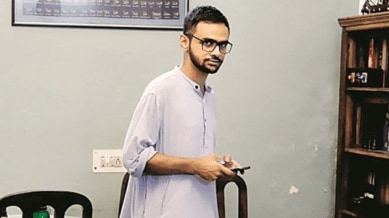Govt opposes Umar Khalid, others’ bail plea in SC: ‘Not spontaneous, 2020 riots attack on nation’s sovereignty’
Solicitor General Tushar Mehta told a Bench of Justices Aravind Kumar and N V Anjaria that he “would like the myth to be busted” that “there was a protest and it resulted in communal riots”.

Opposing the bail plea of Umar Khalid and others in the case of a larger conspiracy behind the 2020 communal riots in the Capital, the Delhi Police told the Supreme Court on Tuesday that what happened was “not a spontaneous riot” but “an attack against the sovereignty of the nation”.
Solicitor General Tushar Mehta told a Bench of Justices Aravind Kumar and N V Anjaria that he “would like the myth to be busted” that “there was a protest and it resulted in communal riots”.
“For example”, accused Sharjeel Imam had said, “It is my heartfelt wish that there is a chakka jam not just in Delhi but for every city where Muslims reside…,” the SG said.
“Then he (Sharjeel) says, ‘are our Muslims that incapacitated that they can’t close down UP? Despite Muslims being 30% of the population, why are the cities able to run?’ He was not talking about only Delhi. The riots were not Delhi-centric according to their plan. It could not spread elsewhere because of security agencies. He goes on to say that Muslims must unite and separate the entire northeast from the country…,” Mehta said.“It is an attack on the sovereignty of the nation when you divide the countrymen on communal lines,” he said.
“Then he says that the real goal is that Delhi should not get milk or water… He challenges the authority of the court… He says ‘court ko unki naani yaad dila denge’ — this is a statement of one of the accused. …I am saying this because a narrative is built that some intellectuals who merely protested, they exercised their fundamental rights to protest,” Mehta said.
Nine riots accused — Umar, Sharjeel, Gulfisha Fatima, Meeran Haider, Athar Khan, Abdul Khalid Saifi, Mohd Saleem Khan, Shifa-ur-Rehman, and Shadab Ahmed — moved the top court after their pleas for bail were rejected by the Delhi High Court on September 2.
Three other accused — Natasha Narwal, Devangana Kalita, and Asif Iqbal Tanha — were given bail by the High Court in June 2021. Another accused, former Congress councillor Ishrat Jahan, was granted bail in March 2022.
The accused themselves were responsible for the delay in the trial, Mehta said.
“We will complete the trial within six months, the moment they cooperate. For the purpose of opposing charges being framed, each accused argued for 4-5 weeks. In some cases, the arguments went for months… This has become a pattern after evolution of the bail law that after one or two years, bail should be granted…,” he said.
Additional Solicitor General S V Raju, also appearing for the Delhi police, told the SC bench Tuesday that Khalid cannot claim parity with Kalita, Narwal and Tanha.
He contended that the HC while granting them bail incorrectly held that UAPA applied only to offences concerning the “defence of India”, and hence the statutory bar on bail under Section 43D(5) would not apply.